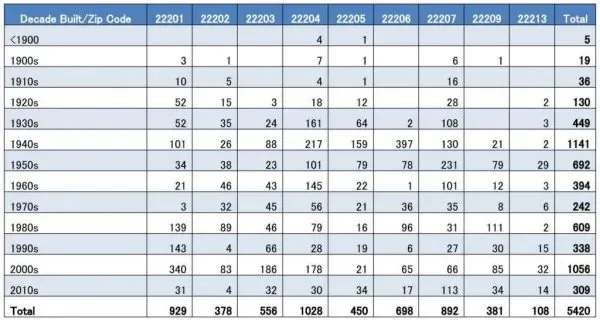Question: I really like the architectural style of older homes and feel like I can get a better deal by focusing on homes built more than 30 years ago. Can you provide me some data showing the number of homes old by age and any suggestions you have for a buyer shopping for an older home?
Answer: I also have a personal preference for older homes and love working with clients who have a taste for unique architectural styles! With a bit of vision and a good checklist of things to watch out for, buying an older home can offer real value. To avoid having your dream home turn into a money pit or safety hazard, here are some things you can do prior to purchasing your home to protect yourself:
-
Double up your inspection: You should always have your home inspected by a reputable inspector, but nobody is perfect, so it’s a good investment to have two sets of professional eyes on the home to ensure maximum coverage.
-
Don’t forget your chimney: A general inspection doesn’t include a full chimney inspection and chimneys tend to be one of the least maintained parts of a home, especially if the previous owner didn’t use the fireplace. A damaged chimney can be unsafe and expensive to fix.
-
Check the structural integrity: Old homes have weathered many storms (literally) and the chances they’ve experienced water penetration at some point is high, especially if it sits in a low-lying area where the ground is likely to hold more water. Talk to your inspector about whether or not it makes sense to have a structural engineer do an in-depth study of the foundation and other structural elements of the home.
-
Electrical testing: There’s a good chance an older home has gone through multiple rounds of electrical updates through a few different owners. You never know if a previous owner was a self-proclaimed jack-of-all-trades who fancied themselves a public servant by day and electrician by night. For the sake of your family, make sure a professional gets behind the walls to make sure everything looks good (wiring is safe, home is properly grounded, etc).
-
Insulation: One of the biggest downsides to older homes is poor insulation, especially if they still have older windows and roofing. Check the home for cold/hot spots, proper insulation installation, and seals around doors and windows.
-
Termites or other wood-destroying insects: Termite/wood-destroying insect inspections are very cheap and worth every penny. In Northern Virginia, sellers are responsible for repairing any termite damage.
-
Lead testing: In addition to testing for lead paint, you may consider testing your water for elevated levels of lead due to leaching from lead pipes or lead soldering, which wasn’t banned in the US until 1986.
Let’s take a quick look at the age of single-family homes sold in Arlington, by decade, from 2012-2016:

If you’d like a question answered in my weekly column, please send an email to [email protected]. To read any of my older posts, visit the blog section of my website at http://www.RealtyDCMetro.com.
Eli Tucker is a licensed Realtor in Virginia, Washington DC, and Maryland with Real Living At Home, 2420 Wilson Blvd #101 Arlington, VA 22201, (202) 518-8781.




